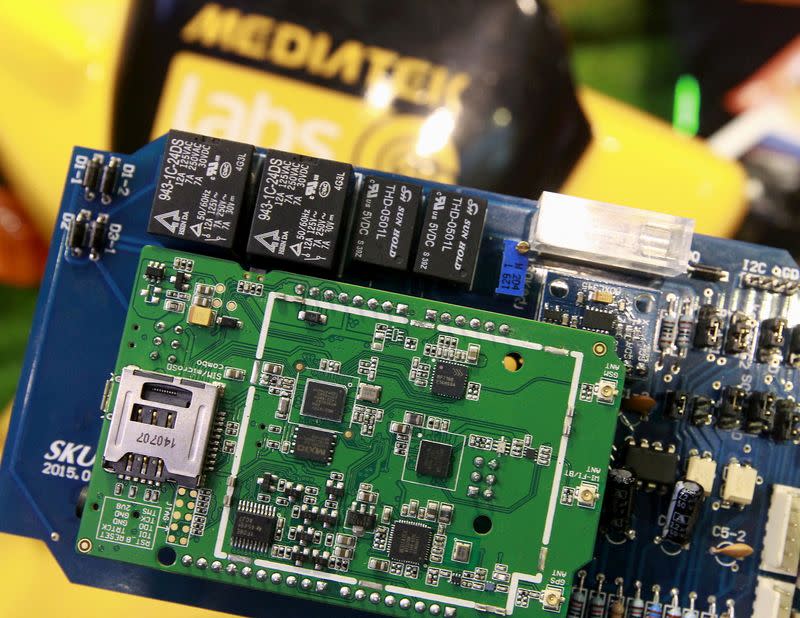Arm, the chip designer owned by SoftBank Group Corp, made a groundbreaking announcement on Monday, unveiling revolutionary technology designed specifically for mobile devices. In response to this highly anticipated development, MediaTek Inc, a prominent smartphone chip manufacturer based in Taiwan, promptly confirmed its intention to integrate Arm’s cutting-edge technology into its upcoming product portfolio.
While MediaTek has traditionally been recognized as a supplier of low- and mid-tier smartphone chips, the company has been actively pursuing opportunities to establish a stronger presence in the market for premium smartphones. This particular segment has long been dominated by Qualcomm Inc, a key competitor of Arm. However, it is worth noting that Qualcomm and Arm have been embroiled in a legal battle since last year, primarily centered around chip licensing agreements.
In an official blog post by Arm, announcing the introduction of their latest products, MediaTek expressed its firm belief that the incorporation of these advanced chips will lead to significant improvements in the performance of their forthcoming smartphones. This move demonstrates MediaTek’s commitment to enhancing its offerings and competitiveness within the industry.
Financial Impact: SoftBank and MediaTek Stocks Soar Following Arm’s Technological Breakthrough
The news of Arm’s groundbreaking technology and MediaTek’s collaboration had a substantial impact on the financial market. SoftBank’s shares experienced a remarkable surge, closing 8.2% higher in Tokyo, representing the most significant jump observed in over a year. Similarly, MediaTek’s shares also enjoyed a moderate increase of 1.1%, signaling positive market sentiment towards the partnership and the potential impact of Arm’s innovative technology on the future of MediaTek’s product lineup.
Masahiro Ichikawa, chief market strategist at Sumitomo Mitsui DS Asset Management, claimed, “Investors have become extremely sensitive to any news about AI or chip technology and jumped on this Arm news,” said Masahiro Ichikawa, chief market strategist at Sumitomo Mitsui DS Asset Management.

Arm, a leading provider of chip blueprints, has announced the launch of two new chips at Taiwan’s Computex conference. The first chip, named Immortalis-G720, is designed for video image processing and AI applications. The second chip, called Cortex-X4, serves as the central processing unit (CPU) for mobile devices.
Manufacturing Process for the Cortex-X4 Completed at TSMC
According to Arm, both chips offer a 15% improvement in performance compared to their previous generations. In addition, the Cortex-X4 is designed to consume 40% less power, which is particularly beneficial for smartphones as it helps prolong battery life.
Arm has also revealed that it has successfully completed the manufacturing process, known as “taping out,” for the Cortex-X4 at Taiwan Semiconductor Manufacturing Co . Typically, this expensive step is carried out by chip designers who ultimately sell the final product.
The introduction of these new chips showcases Arm’s commitment to delivering enhanced performance and power efficiency for mobile devices. By leveraging the expertise of TSMC for manufacturing, Arm aims to ensure the production of high-quality chips that meet the demanding requirements of the market.
During a briefing with Reuters, Chris Bergey, the general manager of Arm’s Client Line of Business, responded to questions regarding the “taping out” process. When asked if this indicated a shift towards selling chips instead of Arm’s traditional business model of providing blueprints to chip makers, Bergey clarified that it was sometimes necessary to test new manufacturing technologies for customers. He emphasized that Arm’s primary focus remained on providing chip blueprints and that selling chips were not their core business.
Recent reports, including one from the Financial Times last month, indicated that Arm was developing its own chip to showcase the capabilities of its designs. Arm specified that the Cortex-X4 chip underwent the “taping out” process using TSMC’s N3E process, which was an industry first.











